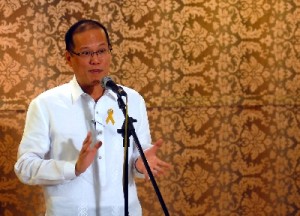LONDON—President Benigno Aquino III told the Filipino community here on Tuesday that the removal of Renato Corona as chief justice of the Supreme Court has restored the system of accountability in government, and he laughed off the former magistrate’s plan to make the rounds of the lecture circuit to talk about transparency.
In his first overseas trip after Corona’s removal, Aquino spoke at length on why his administration went after the magistrate and former President Gloria Macapagal-Arroyo, who is now detained and faces electoral sabotage and corruption charges.
Saying he wanted to speak from the heart to convey his message of reform and good governance to overseas Filipinos, the President discarded his prepared text and spoke for almost an hour in Filipino before an appreciative audience.
The Chief Executive, here on a three-day visit to enhance trade relations between the Philippines and the United Kingdom, even brought out a copy of the Constitution to point out how Arroyo violated the prohibition against midnight appointments by installing Corona as chief justice of the Supreme Court and how Corona skirted the law requiring officials to disclose their wealth.
“The good thing about what happened to Corona is that it restored what we call the system of checks and balances,’’the President said before a gathering of Filipinos at the Intercontinental London Park Lane Hotel here Tuesday night.
Corona’s removal was a message that “all of us public employees should remember that there is actually one boss,’’ he said. “The mandate comes from the people, the power comes from the people and the people are the only masters we should serve collectively. Not some of the people most of the time, but all of the people all of the time. And that is the (practice) that we want to restore.’’
The audience applauded loudly.
The President echoed the now-famous “palusot’’ line of House prosecutor Rep. Rodolfo Fariñas during the closing arguments in the Corona impeachment trial at the Senate. He noted that Corona in effect declared only 1.9 percent of his true wealth and did not declare 98 percent.
“It would have been understandable if you forgot the 2 percent but not if you forgot the 98 percent,’’ the President said.
Aquino said the law was clear that officials must declare all, not some, of their assets.
But Corona, he said, finally admitted during at the end of the trial he had $2.4 million and P80 million in bank accounts which he did not declare in his statement of assets, liabilities and net worth.
“So it was culpable violation of the Constitution,’’ Aquino said.
“Now we read in the newspaper that he will go around to lecture on transparency,’’ Aquino said, eliciting laughter.
Now, the President noted, he is even being dared to sign a waiver to the confidentiality of his bank deposits.
He said he has always declared his assests and libilities in his SALN since becoming a member of Congress.
The President recalled that when he assumed the presidency, he asked for a meeting with Corona to explain to him why he took his oath of office before then Justice Conchita Carpio Morales and not before the Chief Justice.
He said he chose Morales because she was the only one who agreed with him about the constitutionality of his plan to create a “truth commission” to probe cases of corruption during the Arroyo administration.
The President said Corona assured him that the Supreme Court would be fair and would uphold the law.
But instead, Aquino said, the Corona-led high court blocked Executive Order No. 1 creating the truth commission and even allowed Arroyo to leave the country ostensibly to seek medical treatment abroad while electoral sabotage cases were being prepared against her.
He said this would have enabled Arroyo to avoid prosecution since she could have stayed abroad until the time allowed to pursue cases against her would have elapsed.
Aquino also spoke of his administration’s gains in the restoration of good governance, in the fight against poverty and improving the economy.
“I take this opportunity to thank those who voted for me in 2010. To those of who you believed in our theme of reform, and even those who do not believe, there are already good changes in the Philippines,’’ he said.
He said the reforms on the economic front have resulted in credit-rating upgrade for the Philippines and a 6.4 growth in Gross Domestic Product, the highest in Southeast Asia and second highest in the whole of Asia.
He said good governance has empowered the government to address many of the problems of poverty and lack of government resources. He cited bigger budgets for education, cash assistance to the poorest families, universal access to Philhealth, cheaper housing for police and soldiers and better peace and order.
He also told the Filipino community that the Philippines was gearing up to become self-sufficient in rice next year. He said fast and traffic-free travel from north to south would be achieved by connecting the South Luzon Expressway and North Luzon Expressway by 2014.
“I would like to say that all these would happen without people paying for additional taxes. I promised that to you, didn’t I?,’’ he said, to more applause.
Aquino ended his speech with a call for continued support for his administration.
He said he might not be able to solve all the problems in his remaining “four years and 23 days’’ in office. But he said the people are right to expect even a minimum achievement from government.
The President said somebody asked him what he wanted to leave as his legacy.
“Why don’t you come to the Philippines in 2016 and tell me if you still recognize the Philippines?,’’ he recalled saying. “In the end, what I really want is to be able to face all of you in 2016 and tell you, `O hindi ba talagang nabago na tayo (Didn’t I tell you that we’ve changed)?’’’
